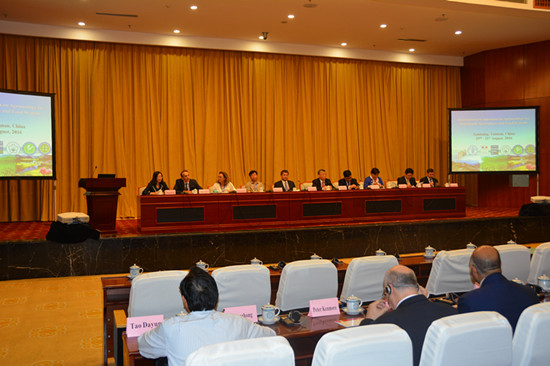分享到
CAAS hosts “International Symposium on Agroecology for Sustainable Agriculture and Food Systems” in Kunming
To promote dialogue and share experiences on implementing agroecology approaches in Asia and China, the Food and Agriculture Organization of the UN (FAO) and Chinese Academy of Agricultural Sciences (CAAS) jointly organized the “International Symposium on Agroecology for Sustainable Agriculture and Food systems” on August 29-31, 2016, which is co-hosted by Yunnan Academy of Agricultural Sciences, with the support of the Government of France.
Agroecology is vital for the sustainability of agriculture and is increasingly receiving attention worldwide. The symposium attracted 200 stakeholders from academia, policy and civil society from across Asia as well as Europe and North America to promote dialogue around the scientific basis and the experiences of implementing agroecology in Asia and China.
“Agroecology is based on the 3 pillars of sustainable development, which is aligned with FAO’s Common Vision for sustainable food and agriculture and contributes to the achievement of the Sustainable Development Goals. The Sustainable Development Goals tell us that, by 2030, we need to shift to sustainable food systems that produce more with less environmental, economic and social costs. In this context, agroecology offers an innovative solution”stressed by Assistant Director-General Ren Wang in his message from the Director General of FAO José Graziano da Silva.
“The 13th Five-Year Plan” sets a clear goal of building a moderately prosperous society in all respects. Agroecology becomes a key component of China’s “ecological civilization”, a priority for the government. “As the national leading institution for agricultural research, CAAS is committed to improving China’s food security and nutrition by research and innovation”, said by CAAS Vice President Wu Kongming, “we have launched four collaborative innovation initiatives, as heavy metal pollution control, black soil conservation, integrated water saving technology for grain production and integrated green production technology, all based on green producing and the principle and philosophy of agroecology to address the rampant diminishing agricultural resources”.
Participants in this symposium highlighted many agroecological initiatives and practices which have a positive impact on the reduction of rural poverty, hunger and malnutrition, promotion of sustainable agricultural development, conservation and sustainable use of biodiversity, improving soil fertility, increasing resilience of agriculture to climate change, and expand work opportunities for rural communities – all of which are essential for achieving the Sustainable Development Goals.

By Liu Yunqing
liuyunqing@caas.cn
Agroecology is vital for the sustainability of agriculture and is increasingly receiving attention worldwide. The symposium attracted 200 stakeholders from academia, policy and civil society from across Asia as well as Europe and North America to promote dialogue around the scientific basis and the experiences of implementing agroecology in Asia and China.
“Agroecology is based on the 3 pillars of sustainable development, which is aligned with FAO’s Common Vision for sustainable food and agriculture and contributes to the achievement of the Sustainable Development Goals. The Sustainable Development Goals tell us that, by 2030, we need to shift to sustainable food systems that produce more with less environmental, economic and social costs. In this context, agroecology offers an innovative solution”stressed by Assistant Director-General Ren Wang in his message from the Director General of FAO José Graziano da Silva.
“The 13th Five-Year Plan” sets a clear goal of building a moderately prosperous society in all respects. Agroecology becomes a key component of China’s “ecological civilization”, a priority for the government. “As the national leading institution for agricultural research, CAAS is committed to improving China’s food security and nutrition by research and innovation”, said by CAAS Vice President Wu Kongming, “we have launched four collaborative innovation initiatives, as heavy metal pollution control, black soil conservation, integrated water saving technology for grain production and integrated green production technology, all based on green producing and the principle and philosophy of agroecology to address the rampant diminishing agricultural resources”.
Participants in this symposium highlighted many agroecological initiatives and practices which have a positive impact on the reduction of rural poverty, hunger and malnutrition, promotion of sustainable agricultural development, conservation and sustainable use of biodiversity, improving soil fertility, increasing resilience of agriculture to climate change, and expand work opportunities for rural communities – all of which are essential for achieving the Sustainable Development Goals.

By Liu Yunqing
liuyunqing@caas.cn
Latest News
-
 Apr 18, 2024Opening Ceremony of the Training Workshop on Wheat Head Scab Resistance Breeding and Pest Control in Africa Held in CAAS
Apr 18, 2024Opening Ceremony of the Training Workshop on Wheat Head Scab Resistance Breeding and Pest Control in Africa Held in CAAS -
 Apr 03, 2024IPPCAAS Co-organized the Training Workshop on Management and Application of Biopesticides in Nepal
Apr 03, 2024IPPCAAS Co-organized the Training Workshop on Management and Application of Biopesticides in Nepal -
 Mar 28, 2024Delegation from the School of Agriculture and Food Science of University College Dublin, Ireland Visit to IAS, CAAS
Mar 28, 2024Delegation from the School of Agriculture and Food Science of University College Dublin, Ireland Visit to IAS, CAAS -
 Mar 25, 2024Director of World Food Prize Foundation visited GSCAAS
Mar 25, 2024Director of World Food Prize Foundation visited GSCAAS -
 Mar 20, 2024Institute of Crop Sciences (ICS) and Syngenta Group Global Seeds Advance Collaborative Research in the Seed Industry
Mar 20, 2024Institute of Crop Sciences (ICS) and Syngenta Group Global Seeds Advance Collaborative Research in the Seed Industry
